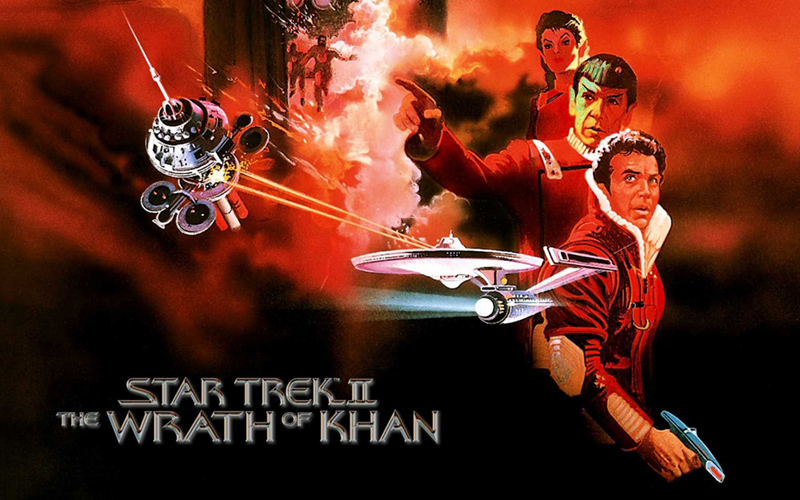Retro Review: Star Trek: Generations
9 min readWhen a madman tries to destroy a star so he can enter a utopian Nexus, Picard seeks the help of a captain who vanished in the Nexus a generation earlier.
Plot Summary: A distress call from a group of El-Aurian transports that have been caught in a powerful ribbon of energy interrupts the christening of the Enterprise NCC-1701-B. Kirk sets Scotty and Chekov to work helping the inexperienced crew beam the El-Aurians aboard, but when he rushes to the deflector array to save the new Enterprise, the energy ribbon rips a hole in the hull, pulling Kirk into space, leaving a safe but grieving crew behind. Nearly eight decades later, Picard, too, experiences tragedy when he receives word during Worf’s promotion ceremony that his brother and nephew – the last surviving members of the Picard family besides himself – have been killed in a fire on Earth. While he tries to cope with his bereavement, leaving a confused Riker to answer a distress call at the Amargosa Observatory, Data asks LaForge to implant the emotion chip left for him by his creator so that he may become more fully human. Data is delighted to experience a full range of feelings, but when he and LaForge beam to the observatory and discover that the scientist Soran has turned a probe into a deadly weapon, Data is too terrified to defend LaForge as Soran takes him hostage. Aboard a cloaked Klingon ship under the command of the Duras sisters, Soran modifies LaForge’s VISOR so that it will transmit visual information from the Enterprise. He also fires the modified probe into the Amargosa star, destroying it and creating a shock wave that impacts the same energy ribbon encountered by the Enterprise-B nearly a century earlier. Picard discovers that Guinan is, like Soran, a survivor of the El-Aurian encounter with the energy ribbon, which she calls the Nexus, and that anyone who has experienced the Nexus becomes addicted to the perfect joy and peace found within it.
Soran agrees to trade the secret to his star-destroying weapon to the Duras Sisters in exchange for passage to the planet Veridian III, where he intends to destroy its star so that he can return to the Nexus. When Picard guesses his course of action, he sets course to follow in the hope of saving the hundreds of millions of people on Veridian IV. While he is on the surface trying to stop Soran, the Duras sisters use information from LaForge’s VISOR to lower the Enterprise’s shields and severely damage the ship. Riker and the crew are able to destroy the Klingon ship, but the Enterprise suffers a warp core breach and the saucer section crashes on Veridian III. Picard cannot stop Soran from destroying the planet’s sun, which brings the Nexus to the planet. As the planet disintegrates, Picard finds himself inside the Nexus living with a happy family. Yet he knows it isn’t real, and when he searches for help in stopping Soran, he finds Kirk living as a happy farmer, disinterested in adventure until Picard makes him realize how artificial life is in the Nexus. Because the Nexus exists simultaneously throughout time, the two captains are able to return to Veridian III before Soran can destroy its sun. While Picard sabotages the probe, Kirk fights Soran, retrieving the launch mechanism but falling into a chasm as a bridge collapses on top of him. The rocket intended to destroy the sun explodes on Veridian III, killing Soran. A dying Kirk tells Picard that it was an honor to fight for the captain of the Enterprise and that it was fun. The USS Farragut arrives to retrieve the crew from the downed Enterprise saucer section, and Picard assures Riker that he expects another ship of that name to be built by Starfleet.
Analysis: Whatever else they think of the virtues or flaws of Generations, most Star Trek fans I know remember it (and refuse to forgive it) for the death of Kirk. Even people who were sick of the character, or who grew up with the Next Generation cast and had less of an investment in the original series, generally agreed that Kirk – whose death had been refilmed already after script changes because it seemed so frivolous as the film was originally shot – deserved a far better departure than this. When I first saw the movie, I agreed wholeheartedly even though I didn’t believe in Kirk’s death and didn’t cry for him; the producers had brought back Spock, how much energy could I waste worrying about whether they’d do the same for Kirk? To this day, rumors persist that Shatner-as-Kirk will return. I don’t think it’s the manner of Kirk’s death so much as the meaninglessness of death in the franchise that makes the moment ring hollow, though having so recently watched The Final Frontier, with Kirk expressing his fear of dying alone and Spock refusing to let him, it’s just not the same having him expire while helping Picard stop a guy who’s not nearly as impressive in his madness as, say, Khan. Yet rewatching Generations, Kirk’s death is, oddly, not the mood-killer I’d expected. There’s lovely camaraderie among the crew, good pacing of the fight sequences, a well-integrated subplot involving Data’s emotion chip, and Worf not being a merry man…perhaps not quite enough when the film was new, too much like an episode of the series rather than a worthy big-screen adventure, but quite enjoyable in retrospect, after a couple more uneven movies.
The beginning is a bit of a disappointment more because of what’s not there than what is. Sure, it makes sense that Kirk doesn’t bring his whole crew to every major ceremony, and it’s logical that Spock is AWOL on Romulus and all that, but Scotty’s and Chekov’s dialogue sounds like it was written for Spock and McCoy, right down to Chekov being the one to pull together a medical team. But we get to see that Kirk still has it – Captain Harriman has to beg him for assistance when Kirk is clearly itching to sit in his chair and simply take care of the mess – and while it’s a disappointment that we don’t get to see Sulu with his daughter, it’s lovely to know that he has one. Plus it’s a bit funny to hear about the Enterprise-B as if it’s the Millennium Falcon, with nothing working when they need it to, though it’s awfully reminiscent of the last two original series movies – one on a brand new ship with problems, one on a soon-to-be-retired ship with problems. Maybe it’s a pitfall of watching too much science fiction – I recently rewatched The Matrix, and was taking mental notes on how everyone from James Cameron to Christopher Nolan continues to swipe from it – but the visual effects don’t impress me all that much, and the Nexus reminds me too much of the wave that knocks Voyager into the Delta Quadrant. It’s arguable that the opening just goes on too long; I understand that in a film called Generations, one wants to be fair to the elder generation, but given that we see so little of all of them, I think it would be fair to jump quickly to the fun of Worf’s promotion and the emotional crises of Picard and Data, who always did get the bulk of screen time when Next Gen was on television.
One thing I really love about both the later original series and all the Next Gen movies is how easily the characters revive their relationships. Data and LaForge pick up just about where they left off, with all the events of “Descent” weighing on them, so naturally Geordi is as skeptical of Data’s wish to give the emotion chip a try as Data is enthusiastic. They can’t know that a big crisis is looming – when isn’t one, really, unless Data waits for shore leave to test the chip? Plus Data needs to be out of commission for the major technobabble moments this episode, since the mechanism by which solar fusion can be stopped makes absolutely no sense even if one takes the existence of “trilithium” as a fact. The stars darken the moment the probes reach them, though their planets and orbiting ships should be several light minutes away, then the stars supernova…looks cool, doesn’t work according to even the basic physics that I know. No one seems to worry much about that stuff, though – it’s certainly not sillier than God at the center of the galaxy. So Data is wracked first by terror, then by guilt, and meanwhile Picard is near paralysis with grief over the loss of his family. Troi senses his agony the moment he finds out, and waits for him to tell her what happened, but he doesn’t until the crisis at Amargosa is already underway – like Harriman at the beginning, not the hands-on captain that’s needed at the moment. The star collapses, the Duras sisters arrive, all sorts of trouble arrives at once.
And finally, after all this time, a bit of backstory on Guinan! I’m not clear why someone who managed to time travel back to San Francisco in Earth’s history doesn’t have some suggestion for getting Soran into the Nexus without blowing up solar systems, but it’s a nice moment between Guinan and Picard, reminiscent of previous ones during “Best of Both Worlds” and the aforementioned “Time’s Arrow.” I wish the scene went deeper – I wish Picard had dared to ask her what perfect joy was like for her, since, like Soran, she lost everything at one time to the Borg – and I wish Picard had shared a bit more of his own pain with Data when Data announced that he’d rather be shut down than feel unhappy emotions, instead of coming across as a stern father figure. But Picard has always preferred to keep a lid on things like that; if Troi hadn’t gone to him, it’s implied that he wouldn’t have gone to her to talk. Data has the emotions of a child, however, and I find it rather disturbing that he cheers the apparent death of the Duras sisters rather than taking a moment to lament the loss of life. With or without emotions, that just seems very un-Data.
Personally, my biggest disappointment with the film is in the construction of both captains’ Nexus fantasy lives. I could see Picard wanting a big happy family, particularly after losing Rene and Robert, but the traditional clothes and traditional wife? The Christmas tree? Those tell me far more about the men writing the movie than about Picard, whom I can’t imagine celebrating Christmas even as a secular present-giving holiday in any reality in which we’ve seen him. Then there’s Kirk, who wants to ride horses – that seems very Shatner – and settle down with the great love of his life – that seems very out of character. The Kirk I know wouldn’t want one woman, but a bunch of women, or at least a different woman every few weeks, with long adventures with his friends in between. At least it doesn’t take long for both men to have “this is not my beautiful house, this is not my beautiful wife” epiphanies and realize they’d rather die saving millions of lives. Kirk’s advice to Picard about refusing promotion, transfers, retirement…that’s the Kirk I know and love, and he wouldn’t need a pep talk from his successor to remember it. Still, the stakes feel lower in Generations than in previous Trek films – not just The Final Frontier with its assault on God, but even The Search for Spock, where the planet at risk had no indigenous life forms. I think the Next Gen movies suffer most from comparisons with “The Best of Both Worlds” and “Yesterday’s Enterprise”…with TV like that, who needs movies?






